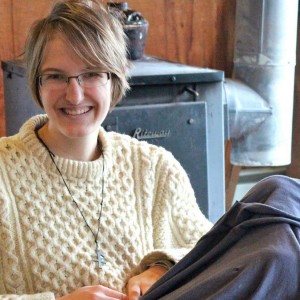We recently received a note from the school nurse explaining that our son’s vision was getting blurry, and we needed to take him to get some glasses. His blurry vision didn’t happen overnight, and he did not even notice until the nurse revealed the problem. Fortunately, the nurse told us the truth, and the doctor was able to solve the problem. Continue reading
Author Archives: G. David Boyd
Setting God’s Table – The Millennials Exodus

© 2011 wplynn, Flickr | CC-BY-ND | via Wylio
(This is part of a series written by Millennials who have either left or stuck with the church. If you are a Millennial and would like to submit your work for publication, you will earn $100. Here is the link. To read more stories about Millennials search Millennial Exodus. If you would like to fund our research among emerging adults, click here.)
Here is Bethany’s story.
Confession time: I am hungry. I don’t mean for snacks; I mean spiritually, socially, meaningfully, hungry. And the church hasn’t exactly filled me up.
Not that I haven’t put in my part. I’ve attended churches across the spectrum, from the one with a steeple to the one that met in a yoga studio.
 I’ve heard great sermons and sung great music, but sermons and music are about as filling to a hungry soul as watching a cooking show is to a hungry body.
I’ve heard great sermons and sung great music, but sermons and music are about as filling to a hungry soul as watching a cooking show is to a hungry body.
I long for community. I desire in the deepest way to know that my life means something, and that I’m not alone, and that God is real. I am a broken person in a broken world, and I want to be healed.
I have tasted these things in church, one bite at a time. There’s the pastor who invited me to lead worship and join the church council, though I was decades younger than the average member. There’s the church camp where I learned that every person–even me–is called by God to love and serve. There’s the nourishment of communion, and the people who look in my eyes every week and tell me that Christ’s body was broken for me.
Maybe I’m stubborn, but I’m refusing to give up on the church. I’m so hungry for a church that will feed my people, but these nibbles of grace are enough to keep me coming back. I’m here to set the table for God’s feast to come, where we will all be fed. I hope to see you there.
“Blessed are those who hunger and thirst for righteousness, for they shall be filled.” –Matthew 5:6
 Bethany Ringdal is a student at Luther Seminary in St. Paul, Minnesota, where she is studying to become a Lutheran pastor. She’s a former camp director, a gardener and avid home-cook, and is being healed every day by the love of God.
Bethany Ringdal is a student at Luther Seminary in St. Paul, Minnesota, where she is studying to become a Lutheran pastor. She’s a former camp director, a gardener and avid home-cook, and is being healed every day by the love of God.
Millennials are now Parents – What does this mean for the church?
 Time Magazine recently featured an article about Millennials examining how they parent. The transition of Millennials as lazy, narcissistic children into parents is happening quickly (The words lazy and narcissistic came from a previous Time article). According to Time, “Millennial parents number more than 22 million in the U.S., with about 9,000 babies born to them each day. This growing cohort of parents is digitally native, ethnically diverse, late-marrying, and less bound by traditional gender roles than any generation before it.” (Source)
Time Magazine recently featured an article about Millennials examining how they parent. The transition of Millennials as lazy, narcissistic children into parents is happening quickly (The words lazy and narcissistic came from a previous Time article). According to Time, “Millennial parents number more than 22 million in the U.S., with about 9,000 babies born to them each day. This growing cohort of parents is digitally native, ethnically diverse, late-marrying, and less bound by traditional gender roles than any generation before it.” (Source)
According to Time, “Millennial parents are attempting to run their families as mini-democracies, seeking consensus from spouses, kids and extended friend circles on even the smallest decisions. They seek wisdom from those closest to them, rather than the highly-marketed “parenting experts.” They’re backing away from the overscheduled days of their youth, preferring a more responsive, less directorial approach to activities.”
Here is the full article.
As Millennials become parents, churches will need to respond to connect to this new generations.
Connectivity with their children.

© 2012 Stephan Hochhaus, Flickr | CC-BY | via Wylio
Through the use of technology, Millennials are used to being in constant contact with their children. Most childcare centers use the latest technology to keep Millennials informed and connected with their children. They don’t want a paper describing the lesson when they can have a picture of their child showing it. Millennials are now the main clientele of the nursery, and their values should affect how we serve them. The days of publicly humiliating them by removing them from the service, or flashing their child’s number on the screen should be over. In order to provide Millennials with the security they desire use an app or a simple text message.
Gender Roles as Parents
Today’s millennials do not hold traditional gender roles. While, the percentage of stay-at-home mothers is increasing (with the recovery of the economy, almost 29 percent of women stay at home with their children), marital roles are more fluid. Train your staff and volunteers to avoid assumptions and comments based upon traditional gender roles so as to not offend visitors or regular attenders. [Load graph of Stay at home mothers from Pew Research.] Avoid sermon illustrations and media pics that present one perspective of family life.
Use, but don’t abuse Social Media

© 2012 Jason Howie, Flickr | CC-BY | via Wylio
“Eight-four percent of Millennials are social media users, with 66% of Gen X on social networks and 44% of Baby Boomers. According to the study, more than half of the U.S. users on Twitter are Millennials.” (Source) We should not abuse these platforms to push our own programs, but use these connections to become involved in the lives of people. The appeal of social media is snap shot of people’s lives, and not desperate pleas to come to your events. Mind your manners on social media, or you eventually will either be ignored or deleted. As a church, use social media in order to understand their daily lives and know their values.
While it is truly impossible to describe how Millennials as a generation will parent, research reveals that they hold different values, beliefs, and perspectives. According to the Time article, Millennials want their children to be, “Open-minded. empathetic. questioning.” These differences will change their expectations for church ministries and staff members.
Church leaders should begin to ask how these values will express themselves as their children enter other ministries of the church. Our nursery workers will be the first to experience Millennials as parents, and they will lead us into this change.
Leave a comment about how Millennials having children will change the church.
Dr. G. David Boyd is the Managing Director of EA Resources, a non-profit designed to equip churches and parents to minister to emerging adults.
An Example of Generational Mediation – Tattoos

© 2009 Lisa Padilla, Flickr | CC-BY | via Wylio
We met at my favorite spot – McDonalds, the home of free wifi and endless sweet tea. The man immediately began to open up about his son, and how proud he was of his academic achievement and occupational accomplishments. At twenty years old, his son was not a slacker or self-absorbed like most other Millennials (if you believe the media). He was already financially self-sufficient, and held down a career job. But in spite of his fatherly pride, something had robbed this father of the ability to enjoy his son.
His son was the last of four children, and had been born to the father much later in life. The father expressed how often he struggled to understand his son in ways that he did not have with his other children who were almost ten years older.
 He had asked his son to refrain from tattoos until he was twenty-one. The father’s reasoning included the under-developed brain of emerging adults, his spiritual viewpoint of tattoos, and their long-term impact upon the individual’s body. Although he couldn’t imagine how anyone would want a tattoo, he would allow his child this option at the proper age.
He had asked his son to refrain from tattoos until he was twenty-one. The father’s reasoning included the under-developed brain of emerging adults, his spiritual viewpoint of tattoos, and their long-term impact upon the individual’s body. Although he couldn’t imagine how anyone would want a tattoo, he would allow his child this option at the proper age.
The son ignored his father’s wishes, and the father’s disappointment was obvious. He was trying not to take his son’s decision personally, but it still hurt. The reasons not to get a tattoo were so clear to him. Why would anyone get a tattoo when “style” change so frequently? He used the word “style” in reference to tattoos several times during our discussion.
I asked what he meant by “style” and he said. “In our world clothing styles change every season, and hair styles change once every couple of months. Why would you get a permanent tattoo?”
While growing up, I often heard people associate tattoos as a trend. With a larger portion of the population getting inked in today’s world, few would categorized tattoos as a style or fad that changes change with time. In my discussions with emerging adults, the decision to get a tattoo often reflected a life event, core belief, or part of their identity (more – Sacred Ink).
They are the opposite of a fad, but tattoos often reflect a person’s longing for permanence and search for uniqueness. The process of globalization has made it even more difficult for people to establish their own place in our world. Tattoos are a simple way for humans to create a marker of their identity.
As I began to speak, there was a beautiful moment as for the first time, the father understood his son’s perspective. We sat in a quiet moment. When our time ended, he turned to me and said, “I have learned a lot. We should talk again.”
 Another day in the life of a generational mediator.
Another day in the life of a generational mediator.
Dr. G. David Boyd is the Managing Director of EA Resources, a non-profit that seeks to equip churches and parents to minister to emerging adults.
Creating a Vision for Emerging Adult Ministry
A vision of a renewed Jerusalem was given by Nehemiah to rebuild the walls. In Nehemiah 2:17-18, Nehemiah says,
“You see the trouble we are in: Jerusalem lies in ruins, and its gates have been burned with fire. Come, let us rebuild the wall of Jerusalem, and we will no longer be in disgrace.” I also told them about the gracious hand of my God on me and what the king had said to me.”
Nehemiah starts with their present condition, and moves to where they should go by providing them a vision and a reminder that God is with them.
A vision does not provide a picture of the way things are, but an image of what could and should be. It focuses a community on where they are going and what must be done to get there. It unifies them as they work towards the common good.
If you are seeking a vision for how to minister to emerging adults, here are a few reflections:
Visions are God-given.
True visions cannot be copied. You do not pick them up at a conference, or by mimicking another ministry model. Visions come while seeking the presence of God. Due to the overwhelming church-as-business culture, the terms vision and mission statement are often misconstrued to be synonymous when they are quite different. We have been taught all visions must be easy to read, look nice in print, and be filled with hip lingo. However, true visions do not require confirmation by human intellect, approval by church hierarchy, and cannot be minimized by available resources. If you want a God-given vision cancel your conference, turn off the noise, and sit in the presence of God’s Spirit.
Visions are Spirit-led.
Leaders are always searching for evidence of the Spirit’s work. They are constantly seeking for stirrings of spiritual growth, and wondering either how they can help, or how to get out of the way. In Henry Blackabee’s study Experiencing God, he says, “Go to where God is at work, and join Him there.”
Due to the dynamic nature of our world, visions can change. They are not eternal, but have a shelf-life which is often dependent upon leadership. This doesn’t mean that the vision was wrong, but that it needs to shift due to our constantly changing world.
Visions are human-powered.
While visions are given by God, we are His hands and feet in this world to accomplish the work. I Corinthians 3:9 says, “For we are co-workers in God’s service; you are God’s field, God’s building.” We have the privilege of working side-by-side with others in God’s service. Because developing and realizing your vision is so much work, it is important to enlist the help of a team.
Nehemiah couldn’t build the wall alone, and neither can you. Look to God for a vision, seeking guidance by the Spirit, and recruit a team to work beside you.
 Where there is no vision, the people perish: but he that keepeth the law, happy is he. (Proverbs 29:18)
Where there is no vision, the people perish: but he that keepeth the law, happy is he. (Proverbs 29:18)
Dr. G. David Boyd is the Managing Director of EA Resources, a non-profit designed to equip churches and parents to minister to emerging adults.
This May All Go to Sh*t: An Open Letter to Millennial Church Leaders – Huffington Post
 Do you know what the hell you’re doing? Because we’re coming clean and admitting that often times we don’t.
Do you know what the hell you’re doing? Because we’re coming clean and admitting that often times we don’t.
For starters, let’s agree we’re past the whole “millennials vs the church” conversation. “Millennials hate the church.” “Millennials don’t believe in institutions or organized religion.” “Millennials don’t tithe because they’re selfish!” We know the stereotypes and stats. We’re just not interested in engaging that kind of click-bait navel gazing. Continue reading
National Congregational Study – 2015
The National Congregation Study led by Mark Chaves, sociologist at Duke, and Alison Eagle. The study included over 3800 participating congregations representing 70+ Christian denominations, plus Jewish, Muslim, Buddhist, and other religious groups. The third wave of this report was recently released, and is available at this link.
Here are five observations from the study.
 1. The Growth of non-denominational churches.
1. The Growth of non-denominational churches.
The number of congregations claiming no denominational affiliation increased from 18% in 1998 to 24% in 2012. White mainline congregations, and the people in those congregations, are older than the congregations and people of other religious traditions. I believe that this trend is going to continue as Millennials (and other generations) do not want to be defined by a denominational label or the culture baggage that some denominations carry.
2. The Continued Growth of Megachurches.
Most congregations are small, but most people are in large congregations. People are increasingly concentrated in very large congregations. The average congregation is getting smaller, but the average churchgoer attends a larger congregation. I believe that many people run to large congregations because they have been hurt by the church, but still love God (a group often referred to as the “Dones”). These large congregations allow them to remain hidden while spending time worshipping the God they love.
3. An Increase in Diversity
There is increasing ethnic diversity over time both among and within American congregations. Diversity (in ethnicity, socio-economic factors, and religious beliefs) is valued by many younger generations, and so I expect this diversity to increase. Truly diverse congregations will become magnets for Millennials.
4. A Desire to connect with their Local Community
Food assistance is by far the most common kind of social service activity pursued by congregations, with more than half (52%) of all congregations listing food assistance among their four most important social service programs. Social action is important to Millennials, and churches should have a clear passion for service within their local communities. However, serving the poor will take much more than clearing our pantries from an abundance of canned goods. I fear that many churches pursue this route in order to alleviate guilt over Western consumerism.
5. Traditional Boundaries into Leadership are Falling.
Acceptance of female lay leadership is very widespread, with 79% of congregations allowing women to hold any volunteer position a man can hold, and 86% allowing women to serve on the main governing board. Congregational acceptance of gays and lesbians as members and lay leaders increased substantially between 2006 and 2012, but acceptance levels vary widely across religious traditions. Those congregations who restrict leadership for various theological reasons might grow as they gather dissident members of accepting communities. However, as Millennials and younger generations become the majority of the populous, these restrictive communities may have trouble replacing their aging populations.
(A boundary that I believe needs to change is the restriction of leadership within the church due to age – READ MORE.)
The Spiritual Landscape of America is changing rapidly. How should your community respond?
 Dr. G. David Boyd is the Founder and Managing Director of EA Resources, a non-profit organization that is driven to educate and equip parents and churches who desire to minister to emerging adults.
Dr. G. David Boyd is the Founder and Managing Director of EA Resources, a non-profit organization that is driven to educate and equip parents and churches who desire to minister to emerging adults.
3 REASONS COLLEGIATE DAY OF PRAYER MATTERS

For over 200 years the last Thursday of February has been set aside as a day to pray for the college campus. The campus that is a few blocks from your home. The campus that is located hundreds of miles from your city in a region of our country that has very little evangelical presence. The campus where you earned a degree. Collegiate Day of Prayer has a significant history in the spiritual awakenings that have been birthed in our nation on the college campuses.
Read more here!
Praying for those who leave for college campuses is very important, that is why, I believe every church should have at least one prayer campaign a year focused on college campuses. If you want to launch a prayer campaign at your church, here is an idea.
 Mark Whitt writes about why the Collegiate Day of Prayer matters to your college ministry. He is the Collegiate and Young Adult Specialist at LifeWay Christian Resources. Before joining LifeWay, he spent many years on the campus of Murray State University as a campus minister.
Mark Whitt writes about why the Collegiate Day of Prayer matters to your college ministry. He is the Collegiate and Young Adult Specialist at LifeWay Christian Resources. Before joining LifeWay, he spent many years on the campus of Murray State University as a campus minister.
National Network for those who Minister to Emerging Adults
In the 1960’s, Wayne Rice and Mike Yacconeli came together to convince the church that ministering to youth was essential for the health of the church. Their vision turned into the organization Youth Specialties. According to Mike, “We sure didn’t know where youth ministry or our little company was headed. All we knew was that God was somehow inviting us into this thing.”
Our culture has shifted in the past fifty years, changing the role of church within our country, the role of faith within the life of the individual, and the metanarrative of human development. These shifts have altered our perception of human development and created a new life phase called “Emerging Adulthood.”
As our world rapidly changes, there is a great need for those ministering to emerging adults to stand and work together.
Together we can accomplish more for the Kingdom. Together we can…
Gather resources, share ideas, and speak as one that we might attract the attention of others.
But it is more than that… we must awaken the voices of EA’s so they can share. Give them platforms so they can be heard. We must show emerging adults that we are listening. We will convince them that they are not the object of our work, but that side-by-side, we will labor.
For in this unity, the church will become all that she was intended to be.
That her body might be whole, and that her beauty might be revealed through diversity as the generations worship our bride – Jesus Christ.
I have glimpses of the vision. I have two hands, one of which holds a pen. I have pennies in a bucket. I know a few people who stand beside me in this work.
It is not much, but it is a start.
Who has hands that are ready to work?
Who has resources to contribute to this movement?
Who has the connections to get the ball rolling?
Who has a passion that cannot be contained?
Who has a vision of what could be?
Not for the sake of any organization, but for the sake of the Kingdom. Not for the sake of another conference, but for our common purpose. Not for the sake of another voice, but a medium through which we can hear His voice.
To whoever has resources, let them give. To whoever has hands, here is a shovel. To whoever has a vision, let them speak.
If you resonate with this call, you may have something to contribute. Please contact me.
May we together step forward in faith, and look forward to seeing what God will do.
 Dr. G. David Boyd is the Founder and Managing Director of EA Resources, a non-profit designed to help churches and parents understand emerging adulthood.
Dr. G. David Boyd is the Founder and Managing Director of EA Resources, a non-profit designed to help churches and parents understand emerging adulthood.
Developing a Vision for Emerging Adults in Your Community
A vision of a renewed Jerusalem was given by Nehemiah to rebuild the walls. In Nehemiah 2:17-18, Nehemiah says,
“You see the trouble we are in: Jerusalem lies in ruins, and its gates have been burned with fire. Come, let us rebuild the wall of Jerusalem, and we will no longer be in disgrace.” I also told them about the gracious hand of my God on me and what the king had said to me.” Continue reading







